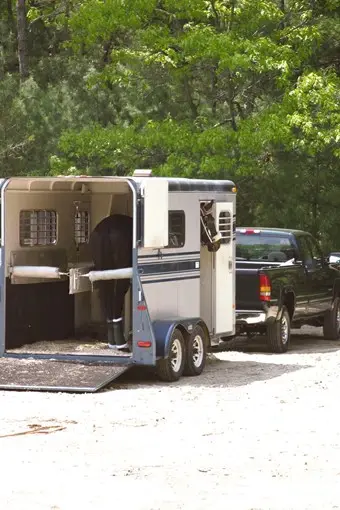Horse Health While Traveling
Updated December 13, 2022

Your best chance of having a happy, healthy horse when you arrive at your destination is to start with one. If you know your horse is sick or unsound, chances are he's not going to improve with a trip to a new place, with a new schedule, around new horses.
Stress during transport - whether in a trailer, plane, ship, or train - can lead to such problems as colic, diarrhea, dehydration, and "shipping fever" or respiratory disease. If your horse is struggling with any current health concerns, your vet may advise you to stay home until he's back to his old self. Even horses that are hale and hearty may still want a veterinary examination before traveling.
While laxatives such as mineral oil or bran mashes are probably unnecessary, electrolytes, antioxidants and certain vitamins may help horses recover more quickly from long-distance transport. You should be aware of the two main areas of your horse’s health that traveling can put at risk: digestive and gastric health.
Management Strategies to Support Your Horse When Traveling

Unfortunately, traveling can be tough on your horse’s digestive health. Several the factors that can increase your horse’s risk for colic commonly occurs during travel. Fortunately, there are ways you can help your horse cope with these common stresses. To tackle the factors that can increase your horse’s risk for digestive issues, consider implementing these smart management strategies before, during, and after your trip:
Try to keep your horse’s exercise schedule as consistent as possible and make any adjustments gradually. If you know your horse is going to work harder than usual at a show or on a long trail ride, plan ahead and increase your horse’s workload gradually before you leave.
If your horse is going to be spending more time in a stall than he usually does while you’re on the road, try to take him out for hand walks or easy lunging sessions as often as possible.
To keep your horse’s hay consistent, consider bringing all the hay you’ll need for your trip from home. If you’re going to be purchasing hay while you’re on the road, bring some hay from home so that you can blend the old hay with the new hay. Changing hay as gradually as possible will help ease the stress on your horse’s hindgut.
Make sure that you offer your horse clean, fresh water every four hours throughout your trip. At overnight stops and your destination, provide your horse with access to water at all times. Additionally, some horses don’t like drinking different water, so consider bringing your own water from home. If your horse can be a bit picky with what water he will drink, try EquiFit CleanBuckets which are designed to minimize bacteria growth and slime.
Just like with your horse’s hay, consider bringing all the grain, supplements, and medications you’ll need for your trip. If you can’t bring your grain with you, look for a local source of the grain your horse eats at your destination. If you’re going to be lowering the amount of grain your horse gets while you’re on the road, try to gradually decrease your horse’s grain ration before the trip and gradually increase it back to your horse’s regular amount after the trip.
Digestive Support for Your Horse While Traveling

Along with the management strategies, daily support from a digestive supplement may help keep your horse’s hindgut healthy and balanced. If you order any of our ColiCare eligible supplements in SmartPaks, you’ll be eligible to apply to enroll your horse in ColiCare, our free program that provides $15,000 in colic surgery reimbursement. This program brings together our best hindgut supplements with annual wellness care from your veterinarian to help lower your horse’s risk of digestive upset.
Equine Gastric Health and Ulcer Medication for Travel
Several of the factors that can impact your horse’s digestive health can also impact your horse’s gastric health, including limited grazing, increased stall time, and a change in routine. In addition, traveling itself can also have a negative impact on your horse’s stomach.
Many of the risk factors for gastric issues can happen any day of the year – whether you’re at home or traveling. It’s a smart choice to provide your horse with a daily gastric health supplement, even if he has a normal, healthy stomach right now. These formulas provide ingredients to help neutralize excess stomach acid and support gastric tissue health so that your horse always has what he needs to maintain his stomach health.
Times of excess stress, such as traveling, can lead to tummy troubles in even the most well cared for horses. So, you may want to give your horse additional support during your trip. Ask your veterinarian if it’s appropriate to provide your horse with extra support from UlcerGard® while traveling. UlcerGard is the only non-prescription medication approved by the FDA for the prevention of gastric ulcers. Giving it once daily during times of additional stress, such as traveling and competing, can help reduce your horse’s risk.